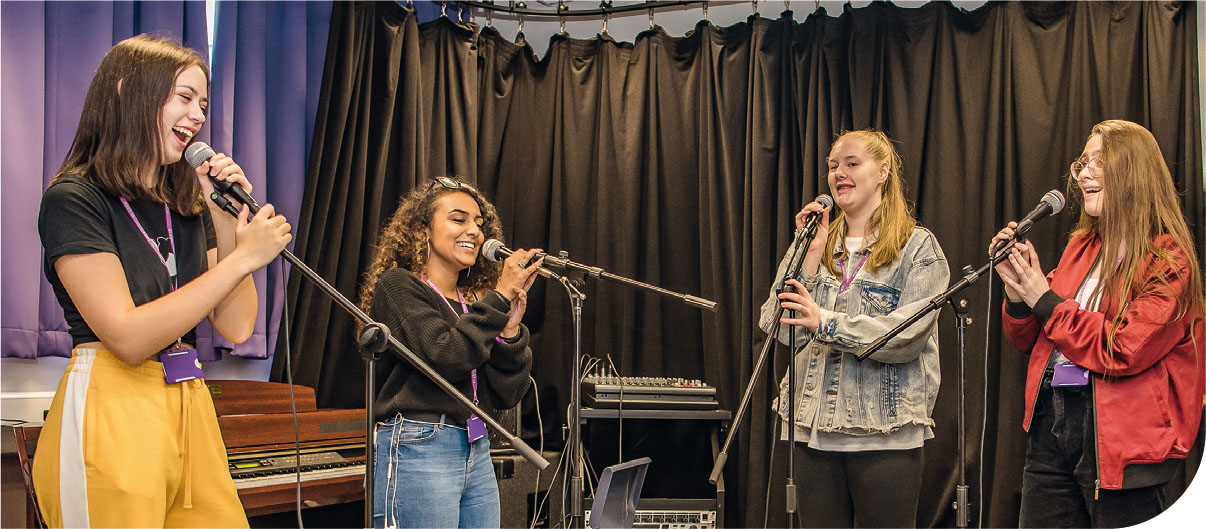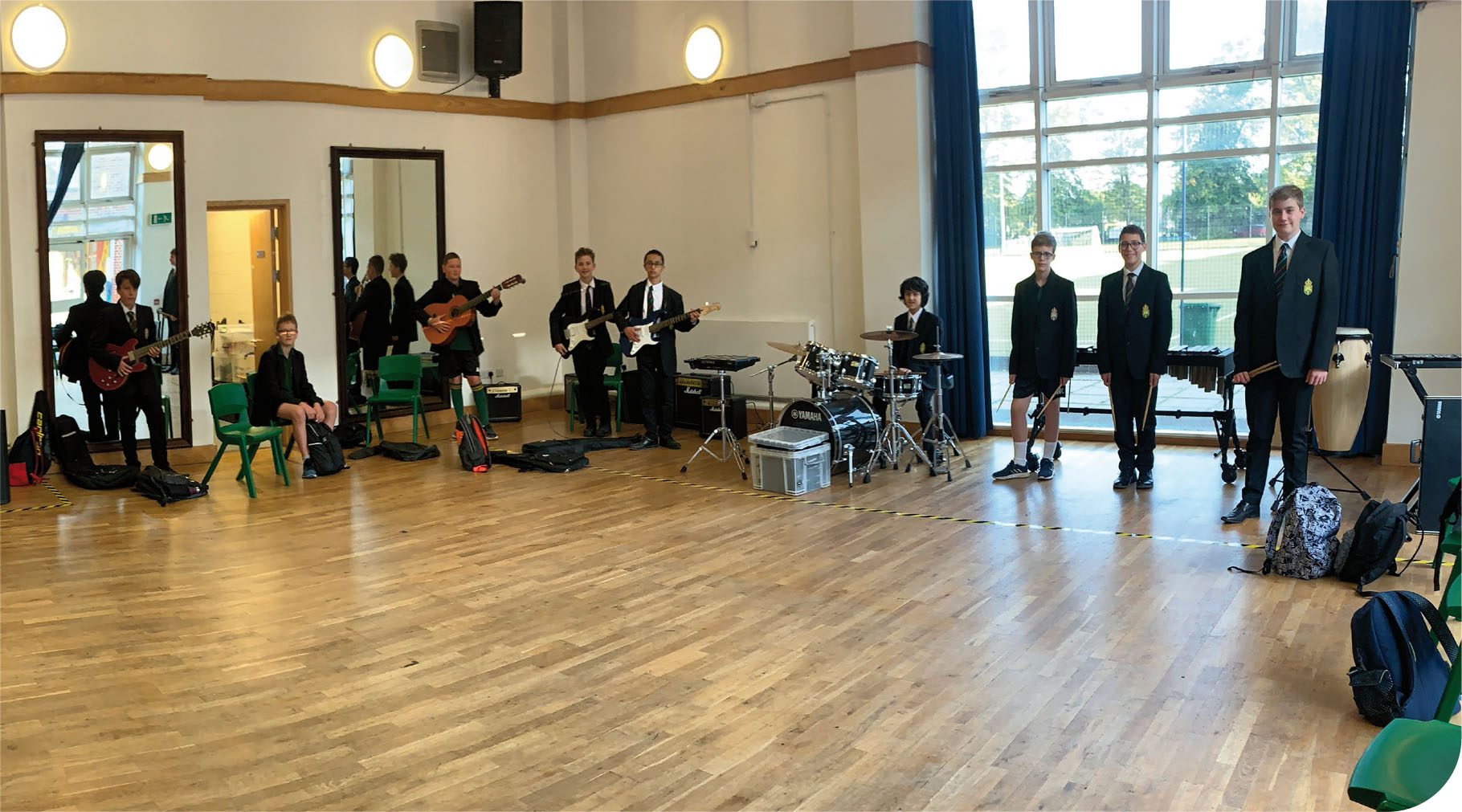
James Manwaring, Director of Music, Windsor Learning Partnership
We are well into the new term now and I am so thrilled to be back teaching. I started September with three words in my mind – CAN DO MUSIC. And so far I have seen this mantra in action every day.
The focus has shifted slightly though, and, I feel, for the better. I am now working with year groups rather than whole school ensembles. While I miss the large groups, I have had a chance to really get to know the students and have some fun making music with them. I have done away with stands and sheet music and favoured jamming and improvising. This has allowed me to use rehearsals to help them develop as musicians. It's simple really: we come up with a key and then create a chordal accompaniment with space to improvise on top. This not only gets some music happening quickly, but it allows for everyone to get involved. The beginners are often just playing four notes while the more advanced players are improvising. It also works well for unusual instrument groupings. My Year 9 group is oboe, flute, sax, four electric guitars, trumpet, bass and percussion. So much fun can be had when the focus is on the music making and not the event or concert.
We all miss concerts, but as I have said to my students, it is all about the music making and we CAN DO MUSIC in schools. It isn't the same, but I have been fuelled and motivated by the progress we are making this term. And I have learnt one thing that doesn't work – worrying about the change. Worrying doesn't get us anywhere. We can do music together, and the students are just so grateful for whatever we offer.
Kate Mayger (Music Teacher) and Craig Cockerill (Curriculum Team Leader), Allerton High School, Leeds
It's pretty hard to summarise, but in essence as a department we have had to compromise, with little government guidance for our subject, while adjusting to the understandable changes in timetabling, setting and rooming, and with limited access to resources. On a more personal level, I guess we have felt disproportionately affected by the restrictions due to running a BTEC course at Key Stages 4 and 5. With 40% of contact time with Level 2 BTEC students in a non-specialist teaching space (with the course being 75% practical) the time available for students to develop instrumental technique and develop their composing skills and ideas is greatly reduced. Additionally, the lack of clarity from Pearson about BTECs has made it difficult to plan for assessment. We have built a department that promotes and values practical skills and musicianship. We have needed to source and create a great number of resources, particularly for Key Stage 3 lessons, where we have re-written schemes and adjusted the curriculum to encompass a greater focus on content, while maintaining the importance of skills development.
It has not been all ‘doom and gloom’, though! It has made us refresh our Key Stage 3 curriculum and look more at content and theoretical grounding in preparation for courses. The older students in smaller groups have been able to complete practical work, wiping down equipment and bringing in their own instruments. Arrangements for post-16 students to leave the site once their lessons have ended means they can use extra time at home for personal practice. The school's consistent use of Edmodo has simplified the process of setting and handing in written coursework. Additionally, we have been able to give music students the opportunity to access licences for music software, meaning that they can continue to compose and record from home. We have also restructured our music events (both coursework and extra-curricular based) so that they can be streamed online, which is making us improve on our technical capabilities and CPD as a department.
Chris Fish, Music Teacher at Alleyn's School, Stone, and Founder of Passing Notes Education

Rising to the challenge: students at Allerton High School, Leeds
I was lucky to have already had experience of online teaching before COVID hit: through my work with Passing Notes Education I had run webinars (and had had to deal with IT issues, so was ready for the challenges that lay ahead!). At school we were well set up with Microsoft Teams and, after some well-needed training, we switched on to full-time online learning.
I teach composition to all our GCSE and A Level students and taught some lessons from the piano at home. We were very fortunate that all students had access to a device at home. This meant that they could complete composition work on a number of free software packages (Garageband, BandLab and Musescore – and also Sibelius and Logic with the free access during lockdown). The biggest challenge I found was being able to give feedback to students in an effective way, as safeguarding precluded one-on-one conversations. With social distancing this has remained a challenge in class, but I am now asking students to submit work through a shared folder on our network, which I then load on my computer at the front of class before giving feedback by asking them to come to the front of the classroom, two metres from me.
Nevertheless, we had some notable successes: we continued with our inaugural Composition Competition, which was jointly won by a Year 13 choral work and a Year 9 singer-songwriter. Our adjudicator, Dobrinka Tabakova, delivered her adjudication via video message, which was then shown on a shared screen during a live Microsoft Teams meeting. A meta-virtual event!
Meanwhile, my work with Passing Notes Education (www.passingnoteseducation.co.uk) continued and I hosted a series of composition CPD webinars, which were attended by dozens of teachers both in the UK and around the world. It was so pleasing to see so many colleagues taking their professional development so seriously despite the hugely difficult circumstances. Throughout lockdown teachers continued to take advantage of our offer of a free download of our e-book ‘Getting Started With GCSE Composition’ (using the code PASSINGNOTESGCSE).
Don Gillthorpe, Director of Music, Ripley St Thomas CE Academy, Lancaster

Students at a Windsor Learning Partnership Academy performing together
It was with some trepidation that I went into this term, knowing that our school choirs and ensembles could only take place with limited numbers, in year group bubbles, and that we had had months and months without rehearsals and performances. We made the decision to start these gradually, year group by year group and, thankfully, participation levels have remained very high. While this has led to an increase in the number of groups, requiring more teacher time out of hours, this way of working does have its benefits: in particular, we are noticing a massive positive change in our singers.
The first group to resume were the eight Year 11 members of our (state school) Chapel Choir who, after some voice-change related transfers, now form a two-to-a-part SATB consort. Some pupils who previously relied on sixth-form singers to give a strong lead are now taking responsibility for their own parts and singing out more than they have ever done before. This increase in individual confidence has been replicated in our other bubble choirs and ensembles, with pupils rising to the challenge really well. I find myself becoming quite excited about how the different groups will sound when we are able to come back together: we should come through this even stronger than before.
It would have been relatively easy to put co-curricular music on hold for the time being, but my team agreed that getting back to some degree of normality was important. This was critical from a musical perspective but, even more importantly, we needed to re-establish our musical community and support network, which had been dormant since March. If you're worried about all the restrictions, or you're not sure where to start, please do have a look at all the wonderful advice on the brilliant #CanDoMusic website (www.candomusic.org) – your pupils need to be making music, and so do you!




